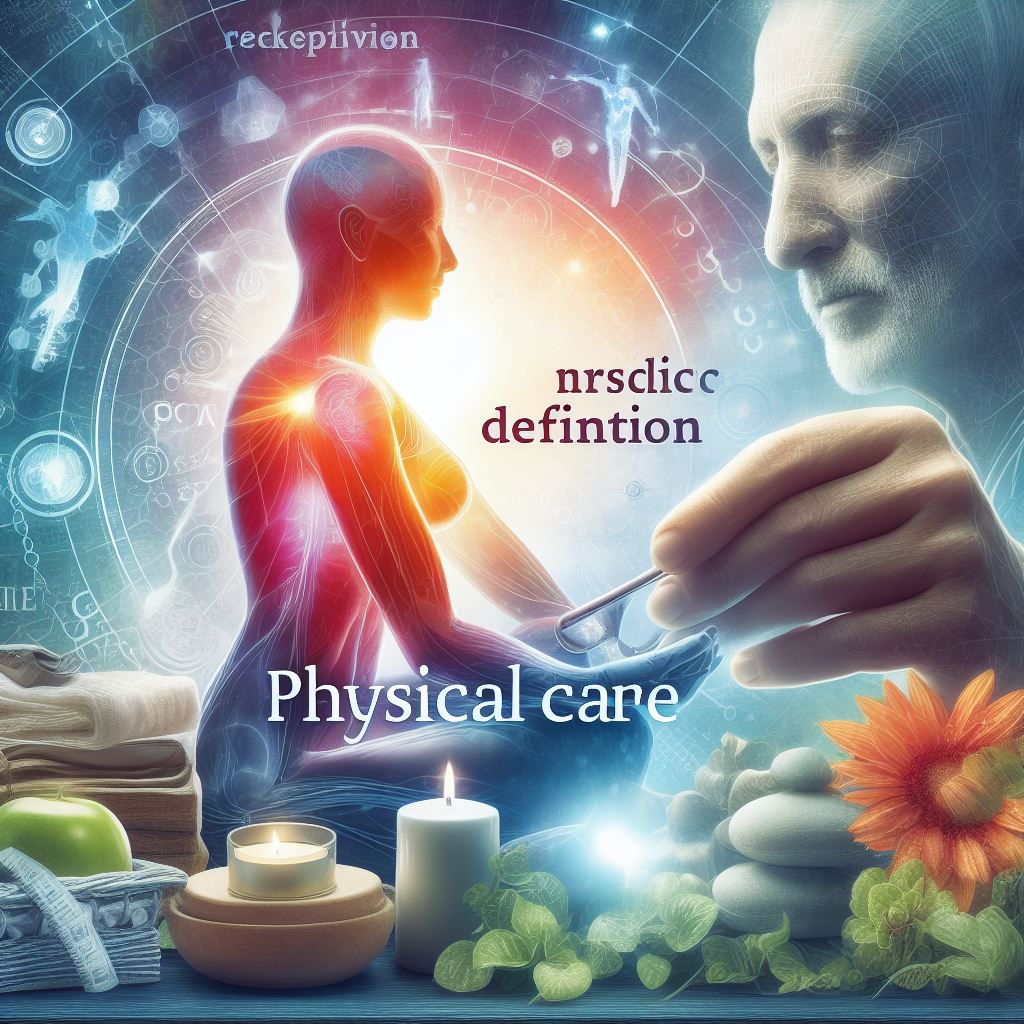- What is Physical Care?
- The Significance of Physical Care
- Key Components of Physical Care
- Mental Health and Physical Care
- Implementing a Personalized Physical Care Routine
- Common Misconceptions about Physical Care
- Integrating Technology in Physical Care
- Physical Care Definition in Different Cultures
- Overcoming Challenges in Physical Care
- Physical Care in Different Life Stages
- Physical Care for Special Conditions
- Balancing Professional and Personal Physical Care
- FAQs
Introduction
In a world bustling with responsibilities, understanding the significance of physical care is paramount. This article delves into the multifaceted aspects of physical care definition, emphasizing its role in achieving holistic well-being.
What is Physical Care?
Physical care extends beyond a mere routine; it embodies a dedicated commitment to nurturing your body. It encompasses a diverse range of activities meticulously designed to preserve and elevate physical health. From mindful nutrition choices to regular exercise, ample rest, and prioritizing mental well-being, each element plays a vital role in shaping the holistic framework of physical care. This comprehensive approach ensures a well-rounded and enduring commitment to the overall well-being of your body.
The Significance of Physical Care
Taking proactive measures to prioritize your physical well-being is an investment in the overall quality of your life. Beyond the superficial aspects of appearance, the care you dedicate to your body influences your energy levels, mental acuity, and emotional balance. It serves as a foundation for a vibrant and fulfilling existence.
Regular exercise, balanced nutrition, and sufficient rest contribute to the optimal functioning of your body. Engaging in physical activities not only enhances cardiovascular health and strengthens muscles but also stimulates the release of endorphins, promoting a positive mood and reducing stress.
Moreover, mindful eating habits provide your body with the essential nutrients it needs to thrive. A well-nourished body is better equipped to combat illnesses and maintain a robust immune system. Adequate hydration, another crucial component, supports various bodily functions, from digestion to cognitive performance.
In the fast-paced modern world, it’s easy to overlook the importance of sleep. Yet, ample and quality sleep is vital for physical and mental rejuvenation. It allows your body to repair and regenerate, ensuring you wake up refreshed and ready to face the day ahead.

Beyond the physical realm, self-care involves listening to your body’s signals and responding with compassion. Regular health check-ups, screenings, and preventive measures empower you to stay ahead of potential issues, contributing to a proactive approach to well-being.
In essence, the intricate connection between your well-being and physical care is a holistic journey. It involves adopting a lifestyle that nurtures your body, mind, and spirit. By prioritizing your physical health, you lay the groundwork for a resilient, vibrant, and joyful life.
Key Components of Physical Care
Nutrition: Fueling Your Body Right
Emphasizing the importance of proper nutrition underscores the foundation of comprehensive physical care. It transcends mere adherence to diets; instead, it revolves around making sustainable, wholesome food choices that actively nourish your body. A well-balanced diet stands as a linchpin for supporting optimal organ function, enhancing energy levels, and fostering overall vitality.
In the realm of physical well-being, the food you consume serves as more than mere sustenance; it is a source of essential nutrients that your body requires to function at its best. Proteins, carbohydrates, fats, vitamins, and minerals—all play distinctive roles in maintaining health and facilitating various bodily processes.
Ensuring a diverse and nutrient-rich intake of food provides the body with the necessary building blocks for cellular repair, immune system strength, and sustained energy. Whole grains, fruits, vegetables, lean proteins, and healthy fats contribute to a robust nutritional profile that supports overall wellness.
Moreover, mindful eating practices, such as paying attention to portion sizes and recognizing hunger and satiety cues, are integral components of responsible nutrition. It’s about cultivating a positive relationship with food, understanding its impact on your well-being, and making choices that align with long-term health goals.
By approaching nutrition with a holistic mindset, you not only address immediate physical needs but also lay the groundwork for enduring well-being. A well-nourished body is better equipped to resist illness, maintain a healthy weight, and sustain the energy levels needed to lead an active and fulfilling life.
In summary, proper nutrition serves as the cornerstone of physical care, providing the essential elements required for the body’s optimal functioning and contributing to a life characterized by sustained health and vitality.
Exercise: Moving Towards Vitality
Regular physical activity stands as an indispensable component of a healthy lifestyle. Whether you engage in a brisk walk, practice yoga, or undertake more intense workouts, exercise plays a pivotal role in keeping your body agile, strengthening muscles, and supporting cardiovascular health.
The benefits of incorporating regular physical activity into your routine extend far beyond the immediate sense of accomplishment. Physical exercise is a key contributor to maintaining flexibility, enhancing coordination, and promoting overall mobility. From simple activities like walking to more intense workouts, each form of exercise contributes to the well-rounded functioning of your body.

The strengthening of muscles through regular physical activity not only improves physical performance but also helps in preventing injuries and supporting joint health. Weight-bearing exercises, resistance training, and flexibility routines contribute to a balanced musculoskeletal system, fostering resilience and longevity.
Additionally, cardiovascular health is significantly influenced by regular exercise. Engaging in activities that elevate your heart rate, such as jogging, cycling, or aerobic exercises, promotes better blood circulation, strengthens the heart, and reduces the risk of cardiovascular diseases. The positive impact on cholesterol levels, blood pressure, and overall cardiovascular fitness cannot be overstated.
Moreover, exercise is a powerful tool for managing stress and improving mental well-being. The release of endorphins during physical activity contributes to a positive mood, reduces anxiety, and enhances cognitive function. It’s not just about physical fitness; regular exercise is a holistic approach to supporting both the body and mind.
Whether you choose activities that are gentle or more intense, the key lies in consistency and finding activities that bring you joy. Making physical activity a regular part of your routine is an investment in your long-term health, contributing to a life that is not only physically agile but also mentally resilient and emotionally balanced.
Rest: The Unsung Hero
Adequate rest is often underestimated. Quality sleep is crucial for physical and mental rejuvenation. It aids in muscle repair, enhances cognitive function, and fortifies the immune system.
Mental Health and Physical Care
The undeniable connection between the mind and body underscores the integral role of mental well-being in the definition of physical care. Beyond the physical aspects of exercise and nutrition, stress management, mindfulness, and emotional balance are crucial contributors to fostering a harmonious and robust physique.
Stress, if left unmanaged, can manifest physically, impacting various bodily systems and contributing to a range of health issues. Incorporating effective stress management techniques, such as meditation, deep breathing exercises, or engaging in activities that bring joy, is essential for maintaining overall well-being. By addressing mental stressors, you positively influence your physical health, creating a foundation for resilience and vitality.
Mindfulness, the practice of being present in the current moment without judgment, complements physical care by promoting self-awareness and reducing the impact of stress. Cultivating mindfulness through meditation, mindful eating, or simply being fully engaged in daily activities contributes to a more profound connection between the mind and body. This heightened awareness allows for better decision-making regarding lifestyle choices that impact both mental and physical health.

Emotional balance is another key element in the mind-body connection. Acknowledging and managing emotions effectively supports a positive mental state, which in turn influences physical well-being. Building emotional resilience through practices such as gratitude, positive affirmations, and maintaining healthy social connections contributes to a holistic approach to health care.
In summary, recognizing the interdependence of mental and physical well-being is essential for a comprehensive understanding of physical care. Stress management, mindfulness, and emotional balance are not just complementary practices but integral components that, when integrated into one’s lifestyle, contribute to a harmonious and robust physique. By nurturing the mind-body connection, individuals can cultivate a state of overall wellness that extends beyond the physical realm, encompassing mental and emotional vitality.
Implementing a Personalized Physical Care Routine
In the realm of physical care, a one-size-fits-all approach is not the guiding principle. It’s imperative to tailor your physical care routine to align with your unique lifestyle, preferences, and health goals. Recognizing what works best for you and integrating it into your daily life fosters sustainable results and a more personalized approach to well-being.
Each individual’s journey toward physical health is inherently different, considering factors such as personal preferences, time constraints, and specific health needs. What works for one person may not necessarily work for another. Hence, the importance of crafting a physical care routine that resonates with your lifestyle and resonates with your individuality.
Start by assessing your own preferences and goals. Consider the types of physical activities you enjoy, whether it’s outdoor sports, gym workouts, yoga, or simply brisk walks. Find joy in the activities you choose, as this not only makes the process more enjoyable but also increases the likelihood of long-term adherence.
Likewise, when it comes to nutrition, focus on a balanced diet that suits your taste preferences and dietary requirements. Explore different foods and cooking styles to find what aligns with both your health goals and your culinary enjoyment.

Moreover, be mindful of your own pace and rhythm. Setting realistic and achievable health goals ensures that your physical care routine remains sustainable. Gradual adjustments to your routine are often more effective and easier to maintain over time.
The key is to view physical care as a dynamic and evolving aspect of your life—one that adapts to your changing circumstances, preferences, and priorities. By acknowledging and honoring your uniqueness, you create a foundation for a sustainable and personally meaningful approach to physical well-being. Remember, it’s not about fitting into a prescribed mold but about discovering and embracing what truly works for you.
Common Misconceptions about Physical Care
Debunking Myths for Clarity
Critical thinking and separating fact from fiction are crucial aspects of effective physical care. It is imperative to debunk common misconceptions to provide clarity on what genuinely contributes to well-being, dispelling myths that may lead individuals down misguided paths.
One prevalent misconception is the idea that extreme diets are the only route to fitness. In reality, sustainable and balanced nutrition is key. Crash diets or extreme eating plans often lack the nutrients necessary for long-term health and can lead to adverse effects on the body. Opting for a well-rounded and individualized approach to nutrition, considering a variety of food groups, is more likely to support overall well-being.
Another myth involves the notion that one specific exercise or workout regimen is universally superior. The truth is that different forms of physical activity cater to diverse preferences, fitness levels, and health goals. Whether it’s cardiovascular exercise, strength training, or flexibility workouts, the most effective routine is the one that aligns with your personal needs and can be maintained over the long term.

Additionally, the belief that more exercise is always better is a misconception that can lead to overtraining and increased risk of injury. Understanding the importance of rest and recovery is vital for overall physical health. A balanced approach that includes regular exercise alongside adequate rest and recovery periods is key to sustained well-being.
Separating fact from fiction also extends to understanding the role of supplements. While certain vitamins and minerals may be beneficial, the idea that supplements can replace a well-rounded diet is inaccurate. A focus on obtaining nutrients through whole foods is generally more effective and sustainable.
In essence, dispelling common misconceptions allows individuals to make informed decisions about their physical care. By embracing evidence-based practices, acknowledging individual differences, and seeking information from reliable sources, individuals can navigate the landscape of physical well-being with clarity and confidence.
Integrating Technology in Physical Care
Embracing the technological era can significantly enhance your approach to health, providing valuable tools that facilitate better tracking, motivation, and adherence to your physical care routine. From fitness apps to wearable devices, these technological advancements offer a wealth of resources to support and optimize your well-being.
Fitness apps have become powerful companions on the journey to better health. They provide a convenient way to track your physical activity, monitor your nutrition, and set achievable goals. Many apps offer personalized workout routines, allowing you to tailor your exercise regimen to your fitness level, preferences, and specific objectives. The real-time feedback and progress tracking features can be motivating, turning your smartphone into a portable fitness coach.
Wearable devices, such as fitness trackers and smartwatches, take the integration of technology a step further. These devices not only monitor your daily steps, heart rate, and sleep patterns but also provide insights into your overall health. The continuous data collection allows for a more comprehensive understanding of your physical activity and lifestyle, empowering you to make informed decisions for better health.
Virtual fitness classes and online communities further leverage technology to create a sense of connection and motivation. Whether participating in live-streamed workouts or engaging in virtual challenges with friends, the digital landscape opens up new possibilities for building a supportive and interactive health community.
Moreover, telehealth services enable remote access to healthcare professionals, making it easier to seek guidance on physical care and wellness. Virtual consultations and online health platforms enhance accessibility, providing timely advice and support.
In summary, embracing technology in the pursuit of physical well-being offers numerous advantages. Fitness apps, wearable devices, virtual communities, and telehealth services contribute to a holistic and tech-savvy approach to health. By integrating these tools into your routine, you can enhance your tracking capabilities, stay motivated, and foster greater adherence to your physical care goals in this technologically advanced era.
Physical Care Definition in Different Cultures
Physical care encompasses a rich tapestry of diverse perspectives from around the world, reflecting unique approaches, rituals, and traditions deeply rooted in the well-being of different cultures. These varied practices highlight the universality of the desire for health while showcasing the richness of human experience.
In traditional Chinese medicine, for example, the emphasis is on balancing the body’s vital energy, known as qi. Practices like acupuncture, herbal medicine, and tai chi are integral to maintaining harmony between the body’s internal forces. This holistic approach intertwines physical health with mental and spiritual well-being.
India’s Ayurveda, one of the world’s oldest holistic healing systems, emphasizes the interconnectedness of the body, mind, and spirit. Ayurvedic practices include personalized diets, herbal remedies, and yoga, with a focus on maintaining balance in one’s doshas—biological energies believed to govern bodily functions.
The Mediterranean diet, rooted in the culinary traditions of countries like Greece and Italy, emphasizes whole foods, olive oil, and a balanced intake of fruits, vegetables, and lean proteins. This dietary approach is associated with numerous health benefits, including cardiovascular health and longevity.
Japan’s cultural practices contribute to the country’s high life expectancy. The traditional Japanese diet, rich in fish, vegetables, and fermented foods like miso and soy sauce, is complemented by mindful eating practices, such as hara hachi bu, which encourages stopping eating when 80% full.

Indigenous cultures often have unique physical care practices deeply intertwined with their connection to the land. The Maori people of New Zealand, for instance, incorporate traditional Māori healing practices like rongoā and incorporate physical activities like kapa haka (cultural performance) as part of their holistic well-being approach.
These diverse perspectives underscore the importance of recognizing and appreciating the multiplicity of approaches to physical care. Learning from different cultures allows for a broader understanding of well-being, encouraging individuals to integrate elements that resonate with their own values and preferences into their personal health journeys
Overcoming Challenges in Physical Care
Strategies for a Consistent Approach
Life indeed presents numerous challenges, yet maintaining physical care should not be an additional burden. Instead, adopting practical strategies can help overcome obstacles, foster consistency, and seamlessly integrate physical care into your lifestyle. By incorporating these approaches, you can make well-being a sustainable and integral part of your everyday routine.
- Set Realistic Goals: Begin by setting achievable and realistic goals. Whether it’s a specific number of weekly workouts, a dietary change, or better sleep habits, breaking down larger objectives into smaller, manageable steps enhances the likelihood of success.
- Create a Flexible Routine: Life is dynamic, and flexibility is key. Design a physical care routine that can adapt to your schedule and circumstances. This ensures that unexpected challenges do not derail your efforts, making it easier to maintain consistency.
- Find Enjoyable Activities: Engage in physical activities that bring you joy. Whether it’s dancing, hiking, or playing a sport, choosing activities you genuinely enjoy increases the likelihood of sticking with them over the long term.
- Prioritize Self-Care: Recognize the importance of self-care beyond just physical activity. Adequate sleep, stress management, and mental well-being are integral components of a holistic approach to health. Prioritize these aspects to create a well-rounded care routine.
- Build a Support System: Surround yourself with a supportive network. Share your health goals with friends, family, or workout buddies who can provide encouragement, share experiences, and contribute to a positive and motivating environment.
- Incorporate Habits Gradually: Introduce changes gradually to avoid overwhelming yourself. Small, consistent adjustments are more likely to become ingrained habits, leading to lasting improvements in physical care.
- Utilize Technology: Leverage technology to your advantage. Fitness apps, reminders, and wearable devices can assist in tracking progress, providing motivation, and establishing accountability in your physical care routine.
- Schedule Regular Check-Ins: Regularly assess your progress and adjust your approach accordingly. This reflective practice allows you to celebrate achievements, identify challenges, and make necessary modifications to stay on course.
- Cultivate a Positive Mindset: Approach physical care with a positive mindset. Celebrate successes, no matter how small, and view challenges as opportunities for growth. A positive outlook contributes significantly to maintaining consistency.
- Make It a Priority, Not a Chore: Shift your perspective on physical care. Instead of viewing it as a chore, consider it a non-negotiable aspect of your routine that contributes to your overall well-being. Prioritizing self-care can transform the way you approach health.
By implementing these practical strategies, you can navigate life’s challenges while making physical care an integral and sustainable part of your lifestyle. Consistency, adaptability, and a positive mindset will empower you to overcome obstacles and foster a lifelong commitment to your well-being.
Physical Care in Different Life Stages
Adapting your physical care routine to different life stages is crucial for maintaining optimal health and well-being. From childhood to the golden years, priorities shift, and understanding these changes allows you to tailor your approach accordingly.
- Childhood and Adolescence:
- Focus on promoting physical activity and healthy habits from an early age.
- Encourage participation in sports, outdoor play, and structured physical education programs.
- Emphasize the importance of balanced nutrition to support growth and development.
- Foster positive body image and self-esteem through encouragement and support.
- Young Adulthood:
- Establishing healthy lifestyle habits becomes pivotal during young adulthood.
- Prioritize regular exercise routines that include cardiovascular, strength training, and flexibility exercises.
- Maintain a balanced diet rich in fruits, vegetables, lean proteins, and whole grains.
- Incorporate stress management techniques to navigate the challenges of work, school, and relationships.
- Foster strong social connections and support networks for emotional well-being.
- Middle Adulthood:
- Focus shifts towards maintaining overall health and preventing age-related conditions.
- Continue regular exercise routines while being mindful of potential changes in metabolism and muscle mass.
- Pay attention to heart health, bone density, and hormonal changes that may occur during this stage.
- Prioritize preventive health screenings and check-ups to detect early signs of chronic diseases.
- Embrace stress-reducing activities such as meditation, yoga, or hobbies to promote mental well-being.
- Later Adulthood and Golden Years:
- Adjust physical activity levels to accommodate changes in mobility and flexibility.
- Engage in low-impact exercises such as walking, swimming, or gentle yoga to maintain strength and balance.
- Focus on maintaining a nutrient-rich diet to support immune function and bone health.
- Stay socially active to prevent isolation and maintain cognitive function.
- Incorporate preventive measures such as fall prevention strategies and regular vision and hearing screenings.
Throughout all life stages, it’s essential to remain adaptable and responsive to individual needs and circumstances. Tailoring your physical care routine to align with each life stage promotes resilience, vitality, and overall well-being. By understanding how priorities shift over time, you can make informed decisions that support health and longevity across the lifespan.
Physical Care for Special Conditions
Adapting physical care practices for unique health situations demands a nuanced approach, emphasizing inclusivity in well-being. Individuals facing special conditions, whether due to health challenges, disabilities, or specific needs, can benefit from tailored strategies that prioritize their overall health while accommodating their unique circumstances.
- Consult with Healthcare Professionals: Before implementing any changes, consult with healthcare professionals who specialize in the specific condition or health situation. They can provide personalized guidance, taking into account medical considerations, limitations, and potential modifications to physical care practices.
- Focus on Accessibility: Ensure that physical care practices are accessible to individuals with diverse needs. This may involve selecting exercises that accommodate mobility challenges, providing assistive devices, or choosing workout environments that are inclusive and accommodating.
- Customize Exercise Routines: Tailor exercise routines to the individual’s abilities and limitations. Low-impact activities, adaptive exercises, and targeted movements can be incorporated to address specific health conditions while still promoting physical well-being.
- Prioritize Mental Health: Recognize the interconnectedness of mental and physical health, especially in the context of unique health situations. Practices such as meditation, gentle yoga, or activities promoting relaxation contribute not only to physical well-being but also to mental and emotional resilience.
- Implement Gradual Progression: Emphasize gradual progression in physical care practices. Whether recovering from an injury or managing a chronic condition, a step-by-step approach ensures that individuals can build strength, flexibility, and endurance safely over time.
- Create a Supportive Environment: Foster a supportive and inclusive environment that encourages individuals facing unique health situations to engage in physical care practices. Encourage open communication, understanding, and mutual support among peers, trainers, and healthcare providers.
- Explore Adaptive Equipment: Consider the use of adaptive equipment or assistive devices that can enhance the effectiveness and safety of physical care practices. From modified exercise equipment to tools that support balance or stability, these adaptations can cater to specific needs.
- Educate and Raise Awareness: Promote education and awareness about diverse health situations within the community. This helps create an inclusive understanding of physical care, fostering empathy and support for individuals facing unique challenges.
- Individualized Nutrition Plans: Recognize the role of nutrition in supporting overall health. Develop individualized nutrition plans that align with specific health conditions, providing essential nutrients and promoting well-being.
- Encourage Regular Check-Ups: Regular check-ups with healthcare professionals are essential for monitoring progress, adjusting physical care practices, and ensuring that the chosen approach remains safe and effective for the individual’s unique health situation.
By adopting a nuanced and inclusive approach to physical care, individuals facing unique health situations can actively participate in well-being practices that are tailored to their needs. This approach not only promotes physical health but also contributes to a sense of empowerment, inclusivity, and overall quality of life.
Balancing Professional and Personal Physical Care
Balancing the demands of work and personal life is a common challenge, and maintaining physical care in the midst of busy schedules is crucial for fostering a harmonious and thriving existence. By gaining insights into effective strategies, individuals can navigate this delicate balance and prioritize their well-being amidst professional responsibilities and personal commitments.
- Schedule Dedicated Time: Treat physical care as a non-negotiable appointment in your calendar. Allocate dedicated time for exercise, meal preparation, and relaxation, just as you would for work meetings or personal commitments. This intentional scheduling helps create consistency and ensures that self-care is not overlooked.
- Incorporate Short, Effective Workouts: Recognize that a workout doesn’t have to be lengthy to be effective. Incorporate short, high-intensity workouts or quick bursts of activity throughout the day. These can be more manageable within a busy schedule and still contribute to overall physical well-being.
- Combine Activities: Look for opportunities to combine physical activity with other aspects of your routine. For example, consider walking or biking to work, using standing desks, or incorporating stretching exercises during brief breaks. Finding ways to seamlessly integrate movement into your daily tasks contributes to overall physical care.
- Prioritize Sleep: In a busy life, adequate sleep is often sacrificed. However, prioritizing quality sleep is fundamental to physical and mental well-being. Establish a consistent sleep routine, create a conducive sleep environment, and recognize the importance of rest for overall health.
- Plan and Prepare Meals: Planning and preparing meals in advance can save time and promote healthier eating habits. Batch cooking, meal prepping on weekends, or choosing simple and nutritious recipes can make it easier to maintain a balanced diet despite a hectic schedule.
- Practice Stress Management: Stress is a common aspect of a busy life, and managing it is vital for overall well-being. Incorporate stress-management techniques such as meditation, deep breathing, or mindfulness into your routine to help maintain a sense of balance.
- Set Realistic Goals: Understand that perfection is not the goal. Set realistic and achievable health goals that align with your current life stage and commitments. Consistency over time is more important than striving for perfection in the short term.
- Establish Boundaries: Clearly define boundaries between work and personal life. Avoid the temptation to bring work-related stress into personal time. Establishing clear boundaries helps maintain a sense of balance and prevents burnout.
- Seek Support: Communicate with your employer, colleagues, and family about your commitment to physical care. Seeking support from those around you can create understanding and potentially lead to a more supportive environment for your well-being.
- Embrace Flexibility: Recognize that life is dynamic, and flexibility is key. Be open to adjusting your physical care routine based on changing circumstances. Adaptability ensures that you can navigate the ebb and flow of work and personal commitments while still prioritizing your health.
By implementing these strategies, individuals can navigate the challenge of juggling work and personal life, fostering a holistic approach to well-being. Balancing professional and personal physical care contributes to a harmonious and thriving existence, allowing individuals to meet their professional responsibilities while prioritizing their health and happiness
FAQs
Is physical care only about exercise and diet?
Physical care extends beyond exercise and diet. It encompasses mental well-being, rest, and personalized routines tailored to individual needs.
Can technology really enhance physical care?
Absolutely. Technology aids in tracking progress, providing motivation, and enhancing adherence to physical care routines.
How can I prioritize physical care in a busy schedule?
Prioritizing physical care in a busy schedule requires intentional planning, setting realistic goals, and recognizing the value of self-care.
Is there an age limit to focusing on physical care?
Physical care is relevant at every age. The approach may change, but prioritizing health remains crucial throughout life.
Can physical care be adapted for special health conditions?
Yes, physical care can be adapted for special conditions. Consultation with healthcare professionals is key for personalized guidance.
How does mental health relate to physical care?
Mental health is integral to physical care. Stress management, emotional balance, and mindfulness contribute to overall well-being.
In conclusion, prioritizing physical care is not just a choice; it’s a commitment to a fulfilling and vibrant life. Embrace the holistic approach outlined in this guide, and witness the transformative power of caring for your body.



nam voluptas molestiae velit blanditiis facere amet cumque. non culpa quaerat esse aut omnis adipisci assumenda voluptatem aut est minima facilis eius temporibus. natus odio unde dolorem voluptatem at fugit voluptatem distinctio illum sit sed. inventore ut blanditiis voluptatem enim et minima delectus eligendi quaerat dolor. possimus et suscipit incidunt ipsam quo enim iusto vel nam voluptas architecto qui omnis.
vel distinctio mollitia quas sit dignissimos optio molestias commodi et nostrum voluptas blanditiis. illum molestiae ut officia iure possimus sunt. numquam dicta iure praesentium veritatis provident nihil dolorum sunt commodi delectus sunt. vel et cum quibusdam quidem occaecati eum unde ipsum.